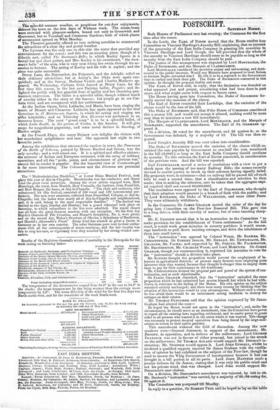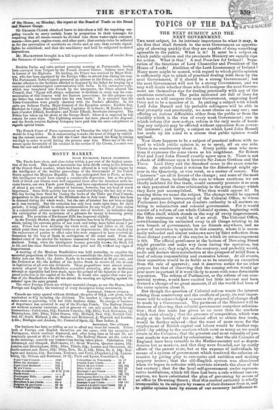POSTSCRIPT
SATURDAY
Both Houses of Parliament met last Mooning; the COM:one fbe the rust time after the recess.
In the Lords, the Line of RIPON Melia that the House rerollt into Committee on Viscount Hardinge's Annuity Bill; explaining, that on account of the generosity of the East India Company in granting life annuities to Viscount Hardinge and Lord Gough, the bill provided that the whole of the annuity to Viscount Hardinge should cease to be payable so long as the annuity from the East India Company should be paid.
The justice of this arrangement was disputed by Lord Mosrreaossa, the Duke of RICHMOND, and the Marquis of CLADRICARDE.
Lord MONTEAGLE considered the provision unjust and unbecoming, and detri- mental to the public interests. Would any Minister have proposed to treat Nelson so because Naples rewarded him ? He felt it to be a reproach to the Government thus to curtail and limit their gift. The Duke of RICHMOND concurred in this opinion: he thought the proposal shabby and mean. The EARL of RIPON said, in reply, that the limitation was founded on what appeared just and proper, considering what had been done in past cases, and what might occur with respect to future cases.
The House having gone into Committee, the Duke of RICHMOND for- mally- moved the omission of the clause.
The Earl of Riroe reminded their Lordships, that the omission of the clause would be the loss of the bill.
The Duke of RICHMOND said, that if the House of Commons considered this a money-bill, and would not accept it altered, nothing could be more easy than to introduce a new bill immediately. The Marquis of CLANRICARDE, Lord MONTEAGLE, and the Marquis of NORMANDY, supported the amendment. The Earl of Sr. GERMANS op- posed it.
On a division, 38 voted for the amendment, and 26 against it; so the Government was defeated, by a majority of 12. The bill was then re- ported.
Lord Gough's Annuity Bill was next taken into consideration.
The Duke of RICHMOND moved the omission of the clause which re- stricted the sum payable by Government to one-half the sum mentioned in the bill (2,0001.) so long as the East India Company should continue its annuity. To this omission the Earl of Itiross consented, in consideration of the previous vote. And the bill was reported.
Earl FITZWILLIAM moved a series of resolutions with a view to put a check upon the passing of too many Railway Bills; the means recently devised to enable parties to break up their schemes having signally failed. His proposals were, in substance—that no railway bill be passed till all such bills be read a second time; that a classification and selection be then made; that in making the selection, care be taken that the aggregate capi- tal required shall not exceed 60,000,000/.
The resolutions were opposed by the Earl of DALHOUSIE, who thought that their adoption would amount to a breach of faith with the public ; and by Lord KMINAIRD, the Duke of WELLINGTON, and some other Peers. They were ultimately withdrawn.
In the Commons, Sir JAMES Gesnali moved the order of the day for going into Committee on the Poor-law Removal Bill. This gave rise to a long debate, with little novelty of matter, but of some taunting sharp- ness.
Mr. E. DENISON moved that it be an instruction to the Committee " to make provision for the establishment of Union settlements." As the bill stood, it would work great injustice in country parishes: it would encou- rage landlords to pull down existing cottages, and drive the inhabitants of them into small towns.
The " instruction " was opposed by Colonel WOOD, Mr. BANKBS, Mr. CHRISTOPHER, Sir ROBERT INGLIS, Mr. HENLEY, Mr. NEWDEGATE, Mr. GRANGER, Mr. PACKE ; and supported by Mr. STRUTT, Mr. PACKINGTON, Mr. BROTHERTON, Mr. CHARLES WOOD, and Lord MORPETH. Sir JAME13 GRAHAM., though not recommending it, expressed his intention to vote for the "instruction" should a division take place. Mr. BASHES thought the proposition would prevent the employment of le- bourers in agricultural districts: at present many farmers were employing more labourers than they wanted, because they thought it cheaper thus to employ them than to pay for their maintenance in the workhouse. Mr. CHRISTOPHER deemed the proposal part and parcel of the system of cen- tralization, and as such objectionable. Sir JAMES Getesussi remarked, that the "instruction" embodied the same proposition which he had submitted last session himself, but which he had with- drawn in deference to the feeling of the House. His own opinion on the subject remained entirely unchanged; and there were many reasons tor thinking that the adoption of this instruction would be very advantageous. Without such a clause, he was afraid there would be an inducement among landlords to destroy the cottages on their estates. Mr. THOMAS DURComBE said that the opinion expressed by Sir James Graham had altered the case— He hoped the House would not agree to the "instruction"; and, under the circumstances, he should move as an amendment, that the Committee have power to repeal all the existing laws regarding settlement, and to confer power to grant relief to all persons who wanted it in the union where it was wanted. This change was necessary to protect decayed operatives from being forced by the large mill- owners to return to their native parishes. This amendment widened the field of discussion. Among the new speakers were—General Joniesokr, in support of the amendment; Mr. BtuanT, in opposition, and in defence of the millowners; Lord GEORGE BENTINCK was not in favour of either proposal, but joined in the attack on the rnillowners; Sir THOMAS ACLAND would support Mr. Deniaon's in- struction; Mr. Snoorme would oppose it. Lord JOHN RUSSELL, whitst he tendered a qualified support, taunted Sir James Graham with the vacilla- tion of opinion he had exhibited on the subject of the Poor-law, though he used to accuse the Whig Government of incompetence because it had not brought in a bill perfect in all its parts. Lord Josue MANNERS made a jocular defence for Sir James; stating that it was only his public mind and not his private mind that was changed. Lord John would support Mr. Duncornbe's amendment.
On a division, Mr. Duncornbe's amendment was rejected, by 105 to 59. Mr. Denison's "instruction" was carried, by a majority of 22;92 voting for, 70 againet it.
The Committee was postponed till Monday.
In reply to a question, Sir ROBERT PEEL said he hoped to lay oisthe table
Of the House, on Monday, the report of the Board of Trade on the Broad and Narrow Gauge.
Sir GEORGE CLERK obtained leave to introduce a bill for requiring sea- going vessels to carry certain boats in proportion to their tonnage; for requiring that all steam-vessels be divided into three water-tight compart- ments—fore-part, engine-room, and after-part; that certain rules be adhered to for the prevention of accidents on rivers and at sea; that certain signal- lights be exhibited; and that the machinery and hull be subjected to stated hropections.
. Mr. MACKINNON brought in a bill to prevent the nuisance of smoke from the furnaces of steam-engines.



















































 Previous page
Previous page